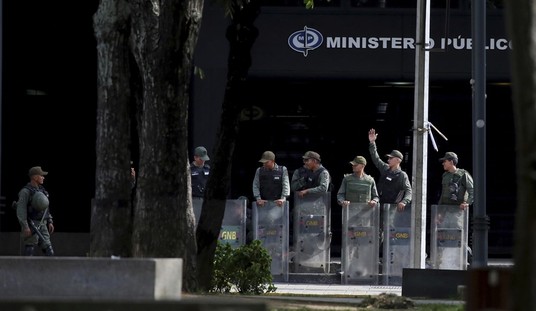The president speaks tomorrow on Libya. Expect him to assure us of success, thousands of lives saved, and a mission now “toned down” and “handed over” to NATO. Let us hope that is all true. But there are existential problems with Libya that will have to be addressed, whether Obama chooses to or not.
1) A no-fly zone will not remove Gaddafi. That is why our cruise-missile attacks and European bombing have already gone beyond the Arab League/UN mandate. Gaddafi, like Milosevic, can win without a helicopter or jet in the sky. To see the rebellion succeed, Obama (or his European allies) must violate the UN and Arab League sanctions that we now boast about following — and destroy his ruling cadre in Tripoli through bombing ground targets, not chasing non-existent jet formations. And that would be “war,” not “kinetic” operations.
2) Borrowing for Tomahawks. We are six to seven trillion dollars more in debt than when we went into Iraq, when the 2003 budget deficit was well under $400 billion, not over $1.6 trillion. The country is now in far more dire economic straits than eight years ago. And the length and expense of this present mission will be calibrated as few missions have been in the past (hence the administration’s understandable insistence on “days,” rather than “weeks” or “months” of fighting). We spent over a $100 million on day one in launching Tomahawk missiles (lots of unemployment checks and shovel-ready stimulus projects that went up in smoke). Even if everything goes well, the cost will be in the billions of dollars, especially rebuilding the infrastructure that we are now blowing up. Perhaps we can ask the strapped Japanese to buy more rather than sell off our Treasury notes—to help fund the Tomahawks and the rebuilding of the bombed-out Gaddafi infrastructure: we need your money to rebuild Tripoli; you can work out your nuclear thing later. (Sort of like telling 400 million Chinese who have not seen a Western doctor to loan us another trillion dollars to implement ObamaCare).
3) Minutemen? I believe there is a Western veneer of rebels and these are good-hearted and brave reformers. And I believe most don’t know an RPG from an IED. Those that do are not pro-Western and not about to remove Gaddafi and his odious bunch in order to foster republican government. The truth is that in the Arab Middle East constitutional government works mostly 1) in Israel; or 2) when the U.S. (in Germany, Italy, Japan fashion) removes a tyrant, destroys his government, occupies the country, writes the Constitution, and puts tens of thousands of troops on the ground to rebuild the society and shoot those who would hijack the reform — as in Iraq. Oddly, these are the two countries Obama has most criticized. So the chance of a lasting Libyan consensual state arising from the ashes of Gaddafi are rather slim without such Western tutelage and expense. I fear the removal of tyrants is not the end of the Middle East war, but merely stage I, in Iranian 1979-1981 fashion, followed by stage II when the Islamists either liquidate the Google executives or co-opt the military.
4) Monster in Recovery? To destroy Gaddafi we must demonize him as a terrorist monster. He is. But there are a few recent problems with that. In the last five years, he had convinced many Westerners — mostly liberals — that he is now OK and should not be judged by the old Bush Manichean “with us or against us” standards. He gave up his WMD in fear of a Saddam-like fate. One of his Western educated kids has bought a reputable PhD from the London School of Economics with a cash-on-the-barrel £ 1.5 million “gift.” The British government released the Lockerbie bomber, got some good oil concessions, and declared the matter over. The so-called Monitor Group, staffed by Harvard professors and other Ivy League idealists, hires scholars for dollars to write encomia about the now good Gaddafi. And Beyoncé and Mariah Carey made a proverbial oil-funded killing performing for the now retrained Gaddafis. Major Western statesmen regularly visit Gaddafi’s tent. So while you and I think that he is a monster, the multicultural left, and the corporate right, think, well, that he either should not be judged by our arbitrary ethnocentric standards, or has lots of oil and money — or both. Bottom line: the reset Gaddafi is a little harder sell as a monstrosity than the body-shredding and Kurd-gassing Saddam Hussein.
5) Who’s Them? The two worst dictatorships in the Middle East are Iran and Syria — just those which the president declared we would not “meddle” in and would seek “outreach” to. The two least bad dictatorships were the Mubarak and Ben Ali juntas — just those we ordered to dissolve. We don’t need absolute consistency from Obama, but we need a tiny bit of it: so please, is our intervention good in Libya to help reformers, and Saudi Arabia’s bad in Bahrain to hurt them? Are there more Libyans dying from tyrannical government and chaos than Congolese or those of the Ivory Coast? And because Yemenis and Jordanians do not vote, should we support them in their efforts to topple their pro-Western monarchs? And are Middle Eastern plebiscites that one time usher in illiberals preferable to no plebiscites that keep in power autocrats more liberal than their people? At least Bush had 23 unique reasons, as put forth by Congress in October 2002 (e.g., from genocide of the Kurds and Marsh Arabs to trying to kill a former U.S. president to harboring the 1993 World Trade Center bomber, etc.), to take out Saddam — most of them would not apply to a Libya or Tunisia or Egypt. Is Libya, then, the end of the beginning or the beginning of the end of the U.S. bombing of oil-producing Arab countries?
6) It’s Only Congress. Both Bushes went to the U.S. Congress before they bombed and invaded. Clinton and Obama did not. Is there a pattern here? The liberal War Powers Act is a good brake on conservative Strangeloves, but a mere nuisance to humanitarian liberal McNamaras? We can argue over the need to get congressional approval before major military operations (I think we must), but I don’t think in my lifetime a U.S. president has ever asked for both a UN and Arab League OK — and not the sanction of the Congress of his own country (e.g., our reps were voted in, theirs were not). That paradox is also unsustainable. At some point the president will either 1) ignore the limitations of the UN and Arab League mandated no-fly-zones (while praising them to the skies); or 2) get so involved that when he finally goes to Congress, Libya is a fait accompli in the way Clinton finessed it during the Balkan bombing. (I am still waiting for Joe Biden to go to Congress to impeach his boss, as he once boasted twice that he would do if any president bombed a Middle East country without congressional approval. Or for that matter, I am still waiting for Senator Obama to demand that President Obama get approval from his peers before, not after, bombing.)
7) Oh, So that Was What Iraq Was About. Libya is now an exegesis of the Iraq War. By now we know that the Bush-Cheney “shredding” of the Constitution (e.g., tribunals, wiretaps, intercepts, renditions, preventative detention, Predator drones, and Guantanamo Bay) was simply a liberal talking point. Why do we know that? Because Obama has either embraced or expanded all of those anti-terrorism protocols, and even hired the very lawyers and deans to legitimize them who used to sue the government to stop them. But Libya was the capstone of the entire liberal reset. When the MSNBC talking heads now support bombing an oil-producing Muslim Arab country that does not threaten our national security — without congressional approval, and with fewer allies than went with us to Afghanistan and Iraq — then we realize the entire Iraq hysteria was simply partisan politics, not about principles. That’s why we won’t see Rendition II at the movies, a return of Cindy Sheehan to network news, or Michael Moore in the VIP seats at the 2012 Democratic convention.
8) No Such Thing As Victory, But Real Defeat? Obama has lectured us that there is no such silly construct as “victory.” I have written that it is an age-old concept that takes no account of technological changes and will outlast Obama quite easily. If you do not believe in victory (in this case, the removal of Gaddafi and his clique, the occupation of the cities by the rebels, and the influx of Western money and expertise to “guide” them), you will not achieve it. That eventuality would mean either a multi-year Iraq-like no-fly zone with Gaddafi in power; a Mogadishu or 1983 Lebanon scram home; or a Joe Biden trademark bisection of the country — in other words, a thing called “defeat.”
9) Virtual War. Team Obama prefers language to reality. We saw that with the silly euphemisms that were supposed to end the war on terror and, indeed, terrorism itself by dubbing them “overseas contingency operations” and “man-caused disasters.” Now we are told that the U.S is “turning over” and “toning down” the war we helped start after a violent week of missile and jet attacks. But even language — or a non-U.S. NATO field commander, or four Arab jets — cannot hide the fact that the U.S. is providing 90% of the missiles, jets, close logistical support, and costs. Here too is our ninth paradox: if you are going to war, at least go to war to win and take the credit for the sacrifice. Are we to remove Gaddafi, take the risk, and thank the Europeans for leading us? Obama does not see that by trying to avoid getting blamed should things go bad, he will not be so able to claim the laurels if they should go well (and it is rather stupid to ever bet against the U.S. military — which brings us to #10).
10. Don’t Bet Against the U.S. Military. The military is still by default running the campaign. Compute the poor leadership from the White House. Add in the politically correct brakes put on our generals and admirals. Factor the multicultural fig leafs tossed about. Don’t forget the savagery of a cornered Gaddafi, and the incompetence of the rebels — and far more — and our pilots can still remove him and in weeks rather than months. They were trained and their weapons of war built far before Obama came on the scene and they will be there far after he is gone from it. Tie them up with tactical, strategic, political, economic, social, and cultural shackles and they still can beat Colonel Gaddafi — especially in a Mediterranean landscape of easy logistics, flat terrain, and good weather — and mostly unobstructed lightly populated targets. If the president can stomach CNN shots of his Stalingrad rubble and Christiane Amanpour weeping about innocents lost as she points to the U.S. serial numbers on the burnt casings of GPS bombs, the U.S. can run him out without sending in the Marines.
Epilogue
So Obama’s problem is not winning a victory that he will be uncomfortable with, but what to do with it after he’s been given it. It will tax all his rhetoric powers to praise the rebels as Jeffersonians as he declares a new sort of multilateral global way of war, while turning the postwar mess over to the oil-hungry and nearby old colonial Europeans as he heads to the fairways — about the best we could hope for at this point. Because of points 1-9, I wrote over three weeks ago that it was a bad idea to go into Libya.
But that does not mean that the U.S. cannot take a very bad idea and still turn it into something salvageable that it should not try again. A Euro-protectorate in Tripoli, run by pro-Western reformers, garrisoned by troops in Balkans-style, all dressed up with EU sanctimonious rhetoric about stopping “genocide” and promoting “humanitarianism,” staffed with Euros, NGOs and UN-types, and with American liberals heavily invested in it, albeit at a good distance, is unlikely and sounds surreal. But it is still possible and the sort of thing we must hope for at this late stage of Obama’s misadventure — a sort of foreign policy bookend to his still spiraling health care fiasco.









Join the conversation as a VIP Member